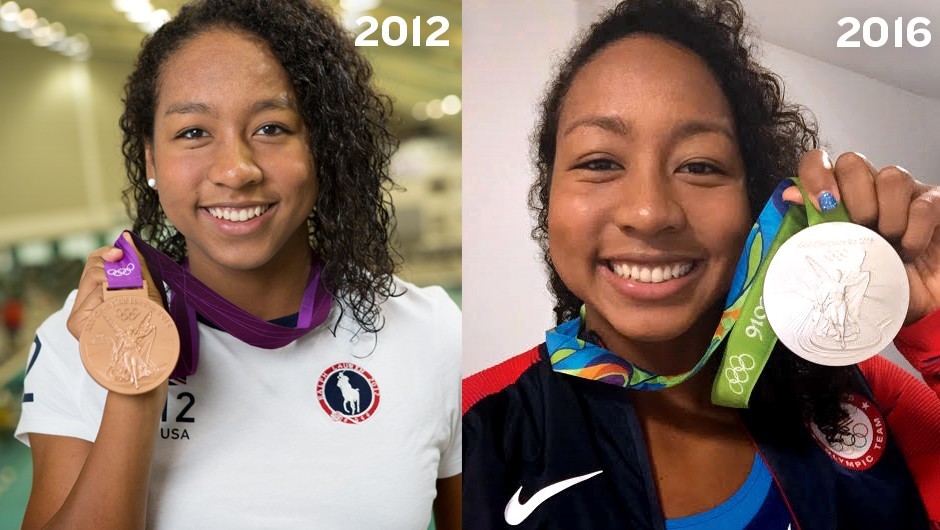Lia Neal started swimming on the Asphalt Green Unified Aquatics (AGUA) Swim Team on a scholarship when she was 8 years old. Today, she is a two-time Olympic medalist, standout student, and co-captain of the Stanford University swim team. We chatted with Lia about her journey to the Olympics, how swimming has impacted her life, and what’s next for the star athlete.
Q: When did you get started in swimming?
A: I always loved playing around the pool. I took lessons when I was 6 years old because my classmates were doing them. I always inherently liked it. When I reached the end of my lessons, I wanted to continue to swim.
Q: What impact have sports and fitness had on your life? What life lessons have you learned?
A: Swimming completely shaped me as a person. I learned how to be efficient, organized, and manage my time well. The people I have met through swimming have made a big impact on who I am today. I’ve learned in sports and in life things don’t always go your way, but one bad race does not have to have a domino effect. You have a say in how the rest of your day goes. You control your attitude.
For example, at NCAA Championships last year, we won the 200-meter freestyle relay and were ready to stand on the podium to receive our medals. We found out we were disqualified, and everyone was bummed and shocked. It was just the second or third day of a long competition. Although we were upset, I was first to tell the team, “Let’s warm down and get ready for tomorrow because we have a lot of swimming left.” We went on to have a great competition, even though it didn’t start out as planned. I carry that attitude with me in life.
Q: Who inspired you?
A: I used to watch a lot of old world championship videos. It was inspiring seeing Team USA compete. I enjoyed watching the best and studied their technique. I don’t think I ever thought it could actually be me competing at the highest level. Of course, I aspired to get there, but I never had a concrete goal of making a world championships or Olympic team. I just took it one day at a time at practice.
Q: What challenges have you had to overcome in swimming?
A: Every bad practice is a challenge. You learn how to push through it. There is struggle in the middle of a tough practice, but you just need to keep at it and understand why you are putting yourself through it. Every practice makes you better. You think of the end goal.
Q: What was it like competing at two consecutive Olympic Games? How did Rio 2016 compare to London 2012?
A: In London 2012, my first Olympics, the accomplishment never really sunk in. Everything felt like a dream. I don’t think I fully processed it until after the Games. I was representing team USA on the biggest stage. It just went by so quickly, and it was so hard for me to realize the magnitude of the experience. I felt incredibly honored. I remember not remembering much because I was in a daze the whole time, experiencing so many new things at once. I really wanted to make the team again so I could appreciate it more.
I cherished the opportunity in Rio and really made the most of it. I took everything in—bonding with the team and meeting other athletes. I had a better understanding of what went into making an Olympic team. It was a more humbling experience. I fully grasped just how hard it is to get to that point. Nothing comes easily.
Q: What is your best memory from Olympics?
A: The memory that sticks out the most was watching Simone [Manuel], who is also my teammate at Stanford, win gold in the 100-meter freestyle. I didn’t expect to be so nervous for her; I was shaking throughout the race. Toward the end, I started crying because I knew she was going to win. I knew how much hard work went into that race. All that training we did together amounted to that one moment. Everyone was just so happy for her.
Q: How did you adjust to life in college? What do you love about swimming on the team?
A: I love the team aspect of college swimming. When you’re competing together and training day in and day out, your teammates become your closest friends. You are working toward a common goal, which is a really unique experience.
Q: Where do you keep your medals?
A: My medals are at home in my room.
Q: What advice do you have for young athletes?
A: Making the Olympic team took 11 years of hard work. Whatever activity you take up, don’t get discouraged if you’re not the best in the beginning. Be patient and keep with it. Hard work pays off.
Q: What’s next for you?
A: Right now, I’m just focused on enjoying my senior season. I’m not sure where I will be or what I will be doing after I graduate. We’re just getting into competitions, and I’m taking it all in.

